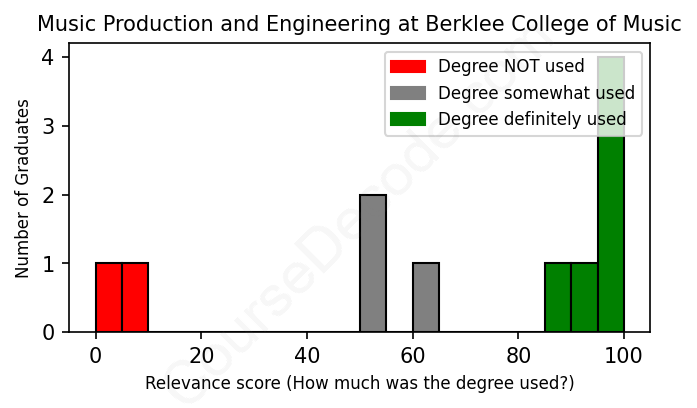
First, some facts. Of the Music Production and Engineering graduates from Berklee College of Music we've analyzed , here's how many have used (or NOT used) their degree in their career:

These are estimates based on AI analysis of 11 LinkedIn profiles (see below).
The verdict? On par with the average. Overall, with an average relevance score of 67%, Music Production and Engineering graduates from Berklee College of Music have about the same likelihood of finding work in this field as the average graduate across all fields:
And for comparison, here's the chart for all profiles we've looked at across all degrees.
Also, after graduating, only 9% of these graduates have pursued further education other than another Bachelor's degree (such as a Masters degree or other), compared to the average across all profiles of 35%. This suggests a Bachelors degree is enough for most Music Production and Engineering graduates, and it's normal to look for work straight after graduation.
See the details:
|
Relevance score: 100% We think this person has gone into a career highly relevant to their degree. We think this person has gone into a career highly relevant to their degree.
DEGREE INFOGraduated in 2013 from Berklee College of Music with a Bachelor's of Music and Science in Music Production and Engineering. No other secondary education since. JOB HISTORY SINCE GRADUATIONIntern The Record Company Jun 2013 - Jun 2015 Audio Engineer and Editor  Soundtrec Jan 2015 - Present Live Sound Engineer  Video Game Orchestra Jun 2018 - Present Live Sound Engineer  A.R.T. Oberon Theater Oct 2013 - Present Audio Engineer  Freelance Sep 2013 - Present ABOUTHello, I'm Matt Peiffer and I'm an audio engineer with experience in recording, editing, mixing, production, and live sound. I've worked with a multitude of artists on the stage and in the studio, as well as award-winning multimedia productions for video games, tv, and film. |
The top 10 most common jobs done by the graduates we've analyzed (ranked most common to least) are:
When looking at the career paths of Berklee College of Music graduates who studied Music Production and Engineering, it’s clear that many have stuck closely to their field. A lot of these folks have landed positions that are directly tied to music, like audio engineers, music producers, and live sound engineers. For example, roles such as Vocal Producer and Assistant Audio Engineer show a strong connection to the skills they learned during their studies, demonstrating that some graduates are effectively applying their education in real-world settings.
However, not every job on this list reflects a direct link to music production and engineering. Positions like Web Developer or roles in sales and administration tend to stray quite a bit from the core music skills that students might expect to use. While some skills from their degree might come in handy, it's definitely a mixed bag when it comes to how closely related these jobs are to their studies. Overall, while many graduates are successfully working in music-related fields, others have veered off into roles that don’t utilize their music production expertise as fully as one might hope.
Here is a visual representation of the most common words in job titles for Music Production and Engineering graduates (this is across all Music Production and Engineering graduates we've analyzed, not just those who went to Berklee College of Music):

When it comes to graduates from the Music Production and Engineering program at Berklee College of Music, there's a pretty mixed bag of career paths. Right out of college, many of them tend to land jobs that are closely related to their field, like audio engineering, live sound engineering, and various roles in production. However, the first job isn’t always glamorous; some start as interns or in entry-level positions, which is pretty common in the music industry. A notable example is a graduate who interned at The Record Company before moving up to an audio engineer position. Others might land creative roles, like songwriters or vocal producers, which shows that they’re getting a chance to flex their creative muscles early on.
Fast forward five to ten years, and it seems like their career trajectories can vary pretty widely. Some graduates have really built solid careers, continuing to work as freelance audio engineers, production managers, or even co-founding their own companies. Others, unfortunately, have shifted into less related roles, like sales or tech positions. There are also some who have taken on teaching positions, which can be fulfilling even if it’s not directly tied to their degree. Overall, while many Berklee graduates find ways to stick closely to music production and engineering, it’s clear that not every path remains directly tied to their original passion, and some may find themselves taking detours in their careers.
Getting a Bachelor’s degree in Music Production and Engineering at Berklee is definitely no walk in the park, and it’s probably harder than the average degree out there. You’ll be diving into a ton of technical stuff, like sound design, mixing, and recording techniques, plus you’ll need a good ear for music and the ability to work with a bunch of different software and equipment. On top of that, Berklee has high standards and expects a lot from its students, so you’ll be juggling projects, collaborative work, and probably some late nights to get everything done. If you’re passionate about music and willing to put in the effort, it can be a rewarding experience, but be prepared for some challenges along the way!
Most commonly, in the LinkedIn profiles we've looked at, it takes people 4 years to finish a Bachelor degree in Music Production and Engineering.
Looking at these Berklee College of Music grads, it seems like they're navigating a mix of decent gigs and some not-so-great ones, which is pretty common in the arts world. The ones who’ve landed consistent jobs as audio engineers, producers, and teachers are probably doing alright financially, especially the ones growing into roles with more responsibility, like the Production Manager at House of Blues. On the flip side, some seem to bounce around different roles or take on freelance work, which can make income a bit unpredictable. Overall, it looks like some are doing well, but a few are definitely still trying to find their groove in what can be a pretty competitive industry—so it’s a mixed bag!
Here is a visual representation of the most common words seen in the "about" section of LinkedIn profiles who have a Bachelor degree in Music Production and Engineering (this is across all Music Production and Engineering graduates we've analyzed, not just those who went to Berklee College of Music). This may or may not be useful:

Here are all colleges offering a Bachelor degree in Music Production and Engineering (ordered by the average relevance score of their Music Production and Engineering graduates, best to worst) where we have analyzed at least 10 of their graduates:
| College | Score | Count |
|---|---|---|
 Berklee College of Music Berklee College of Music
|
67 | 11 |